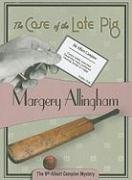What do you think?
Rate this book


224 pages, Paperback
First published January 1, 1937
I am not one of these intellectual sleuths, I am afraid. My mind does not work like an adding machine, taking the facts in neatly one by one and doing the work as it goes along. I am more like the bloke with the sack and spiked stick. I collect all the odds and ends I can see and turn the bag at the lunch hour.